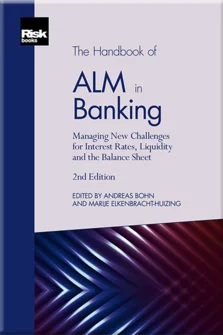Funds Transfer Pricing in the New Normal
Robert Schäfer, Pascal Vogt and Peter Neu
Introduction
Bank Capital and Liquidity
ALM in the Context of Enterprise Risk Management
The New Basel Standards on IRRBB and Their Implications for ALM
Measuring and Managing Interest Rate and Basis Risk
The Modelling of Non-Maturity Deposits
Modelling Non-Maturing Deposits with Stochastic Interest Rates and Credit Spreads
Managing Interest Rate Risk for Non-Maturity Deposits
Replication of Non-Maturing Products in a Low Interest Rate Environment
Managing Mortgage Prepayment Risk on the Balance Sheet
Considerations for ALM in Low and Negative Interest Rate Environments
Credit Spreads
Hedge Accounting
Supervisory Views on Liquidity Regulation, Supervision and Management
Measuring and Managing Liquidity and Funding Risk
Managing Reserve Assets
Instruments for Secured Funding
Asset Encumbrance
Capital Management
A Global Perspective on Stress Testing
Reverse Stress Testing: Linking Risks, Earnings, Capital and Liquidity – A Process-Orientated Framework and Its Application to Asset–Liability Management
XVAs and the Holistic Management of Financial Resources
Optimal Funding Tenors
Funds Transfer Pricing in the New Normal
Balance-Sheet Management with Regulatory Constraints
Funds transfer pricing (FTP) is a term used to describe the sum of policies and methodologies a bank applies in its internal steering systems to charge for the use (and credit the generation of) funding and liquidity. Commonly, FTP is embedded in economic value added (EVA) or return on equity (ROE), return on risk-adjusted capital (RORAC) performance measures of single transaction or a business line’s risk-adjusted profitability or performance as a complement to capital consumption. It focuses on distributing the bank’s funding and liquidity costs to the beneficiaries of these scarce and valuable resources. As such, FTP is an extremely powerful tool, which is deeply rooted in any divisional profit and loss (P&L) or profit centre calculation. In fact, FTP is the means by which a bank’s overall net interest income can be split into originating units and subunits, thus enabling the bank’s management to perform an effective planning, monitoring and control cycle. As a consequence of the 2007–9 global financial crisis these costs are material and need to be allocated. They can turn a business line’s performance or product’s profitability from positive to negative and vice versa. Thus
Copyright Infopro Digital Limited. All rights reserved.
As outlined in our terms and conditions, https://www.infopro-digital.com/terms-and-conditions/subscriptions/ (point 2.4), printing is limited to a single copy.
If you would like to purchase additional rights please email info@risk.net
Copyright Infopro Digital Limited. All rights reserved.
You may share this content using our article tools. As outlined in our terms and conditions, https://www.infopro-digital.com/terms-and-conditions/subscriptions/ (clause 2.4), an Authorised User may only make one copy of the materials for their own personal use. You must also comply with the restrictions in clause 2.5.
If you would like to purchase additional rights please email info@risk.net











